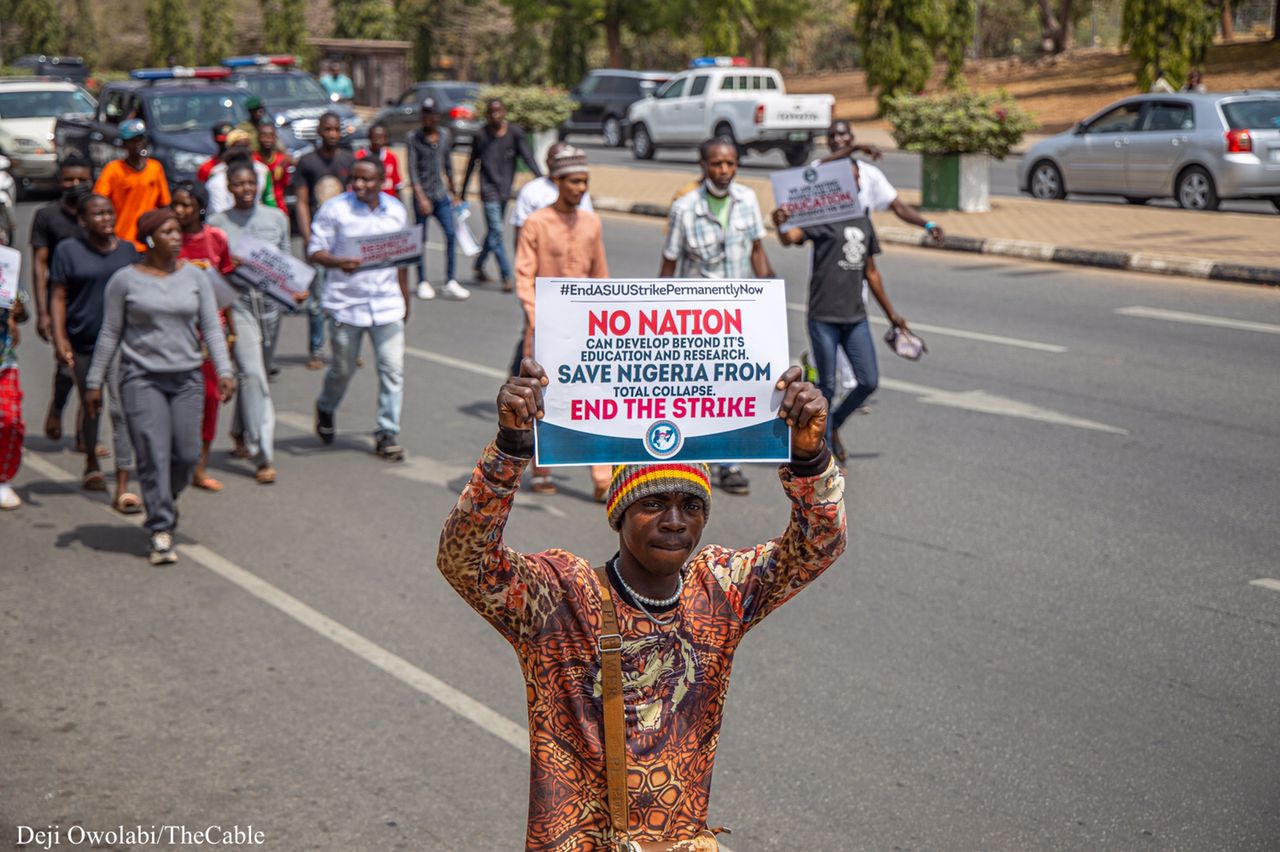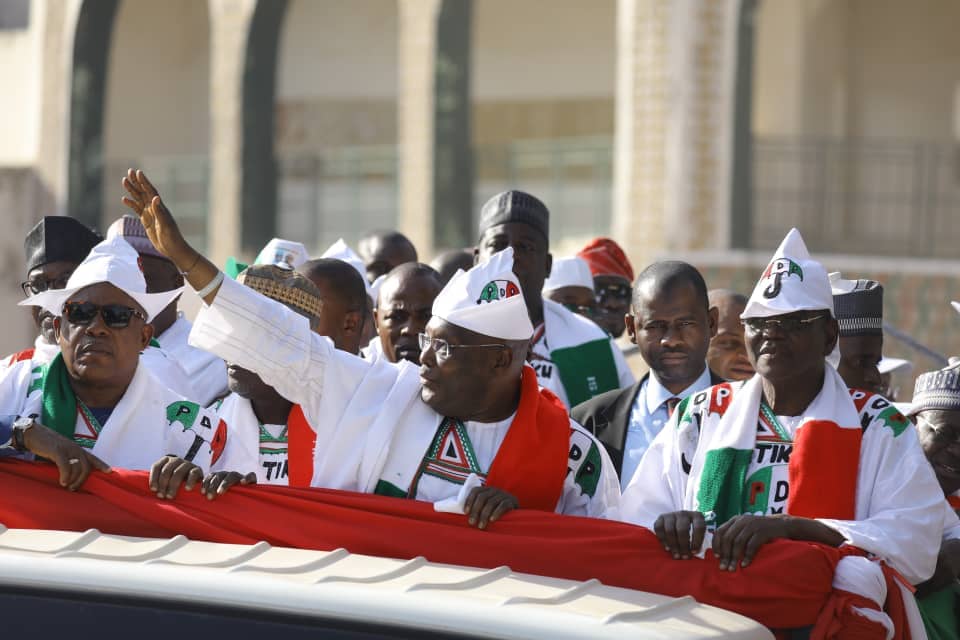There is about nothing new, to be honest, anyone can write or say about the “Abiku/Ogbanje” child called ASUU. A search for the acronym “ASUU” on TheCable nNews platform alone produces about 35,200 results, while “ASUU strike” generates 28,800 results. When you streamline the search to ASUU > viewpoint, this reduces the number of hits to about 1,090 results. There have been tons of write-ups focusing exclusively on ASUU and the solution to the burden associated with the trade union’s challenges for Nigerian universities and the nation. I have also demonstrated elsewhere, that ASUU leaders operate like a cult in managing the union’s affairs and succession within that trade union. We are likely to find a pool of workable solutions in the fair share of discussions, opinion pieces, advice, support, and anger directed at ASUU over the years. Therefore, ASUU probably needs no further enquiry.
The arguments and widely held views that make it impossible for us to deal with and resolve the challenges of ASUU include the following;
- The federal government has been irresponsible, unresponsive, and selfish in dealing with the crisis in the education sector.
- The government has perennially failed to honour its freely entered agreement with ASUU.
- Politicians have always overpaid themselves and neglected the education sector, thus perpetuating the decadence.
- Too little has continuously been allocated to education and higher education, especially for many years, exacerbating the problem.
- Changing the current funding system for higher education in Nigeria would make higher education less inclusive because poorer citizens would probably not be able to fund their education. Therefore, university education would become the exclusive preserve of the elite and their cronies.
- Creating a support system (bursaries and loans) for the poorer citizens will not work because it would be abused and taken over through the back door by the powerful who control government regulations in ministries and other government departments.
- There is more than enough money to fund education in Nigeria if governments appropriately allocate funds, minimise corruption, and politicians and public officials demonstrate commitment and selflessness.
- ASUU members are elite of society in terms of their dedication, commitment, and sacrifice over the decades. However, they continue to be underpaid, undervalued and non-competitive globally. The resultant and associated brain drain has damaged university education particularly inexplicably.
A critical evaluation of these arguments would reveal several myths with some of these arguments that ASUU members over the years have managed to convince members and a large part of the public as realities. If you somehow tell yourself some lie repeatedly, you will probably begin to believe it. ASUU now believes her own story – fair enough.
Yet, ASUU has come a long way. It is a progressive movement and a trade union that has fought many governments to a standstill. They have achieved incredible feats for both the universities and their members. Without these recurring fights, perhaps things would have gotten to no return for the university sector. Nigerians, therefore, need to collectively praise ASUU’s resolve to stand with and for the system and ensure progress. Over the last nearly a decade, the problem is that the game has changed, and the people/group who bear the brunt face excruciating pain with ASUU ignoring them. Therefore, if you evaluate both public support and members’ support for ASUU’s lingering crisis-ridden university sector, this support has significantly declined.
Advertisement
Historically, it is unusual to have as many groups and individuals as we now have who are not supporting ASUU’s cause. Students, parents, academic staff, and other stakeholders are more courageously speaking up against ASUU. It is like biting your nose to spite your face because ASUU continues to argue it is correct and is doing the right thing. ASUU argues there is nothing they need to change and that the government understands only the language of a total strike.
The battles are fought and won with men in the ancient Yoruba wars (not fought with missiles and other deadly weapons as in Russia-Ukraine ongoing war)! In ancient and historical battles, anecdotal and oral history reports that the Yoruba generals often fought from the front (not from the office as many of today’s military generals). These generals are urged on by the supporting and roaring fighters/soldiers in a wisdom laden folklore song too difficult to translate perfectly “W’eyin re wo, bo lomo ogun, bo lomo ogun, w’eyin re wo“. We can roughly translate the phrase as watch your back and examine if you have fighters or not. If your soldiers begin to disappear behind you, the war is getting too hot for them. The Yorubas then propose a solution “moja mosa ni a fi nmo akikanju loju ogun”. This counsel is probably best translated as he who fights and runs away strategically lives to fight another day. ASUU is failing to recognise they might soon be alone in this fight. When they look back, someday, they might find themselves alone. They become increasingly vulnerable and may lose the battle irreversibly as that happens.
Let us reflect on three quick examples to drive home the point.
Advertisement
First, Nigerian students, parents, and other stakeholders have lost much from university closures. The closures have been too frequent, too paralysing, and too disruptive. Not many foreign universities and other collaborators would find it attractive to collaborate with Nigerian partners. Students and staff exchanges, which are valuable in enhancing students’ experience, are impossible to plan jointly with a Nigerian university by foreign collaborators. It is nearly impossible to plan and make postgraduate education applications and sponsorship/scholarship applications for a Nigerian student. These have a significant bearing on universities’ reputation, ranking, and growth.
When was the last time Nigerian universities could boast of the presence of international staff and students? The government officials and politicians who could have shared the suffering and hasten to make amends in the failing system have their children in foreign universities. Many ASUU members have their children in foreign or local private fee-paying universities. They do this even with the low wages under dispute. Therefore, those who suffer the adverse consequences are the same children of citizens on whose behalf and for whose interest ASUU claims to be fighting.
Secondly, I am unaware of a single location anywhere in the world where employees, through their trade union, decide how they should be paid and what software system they prefer. Trade unions fight for their members and insist on their members being always paid fairly. They would usually not argue that employers should not use a payment system, let us call it “Apple software” [IPPIS] but must only use, let us call it “Microsoft software” [UTAS] to pay their members. It touches on borderline aggression, lack of cooperation and outright arrogance. Employees want to be paid correctly and fairly. I would be furious as an employee and member of a trade union if my salary is denied or delayed merely because my trade union want it paid by their preferred means. As an employer, I believe I would be suspicious.
Therefore, the question remains that everyone should know how much they should be paid based on agreement with employers. Each employee should check it monthly, and if it is correct, everyone should live in peace. ASUU has unknowingly become so spoilt and pampered they have forgotten the roles of trade unions, the boundaries of the tripartite relationship and the very essence of their existence.
Advertisement
Thirdly, perhaps the most embarrassing example has come from the Committee of Vice-Chancellors of Nigerian Universities’ Spouses’ (CVCNUS) recent public statement. Like their predecessors, the Nigerian Army Officers’ Wives Association (NAOWA) and the Nigerian Governors Wives Forum (NGWF), the Committee of Vice-Chancellors of Nigerian Universities prepared to send their spouses (husbands included probably) to Turkey for a jamboree using the public purse. However, they quickly shelved the madness following public outcry. Thankfully, in their most recent press statement, ASUU also condemned this preposterous event, not the group. However, I am curious how perfectly the “gown” had been mimicking the “town”. Vice-Chancellors are former ASUU members, many of whom re-join ASUU when they complete their term of office. Apart from differences in opportunities, how different (from politicians and militricians) are these “VCs” ASUU members?
The strength of a trade union is in its members and the support they give the trade union. In the case of ASUU, in addition to her members, there are other important stakeholders – students, parents, government, other university staff members (non-academic), trades and other business people affiliated with the universities. The source of livelihood for these people rests almost exclusively on a vibrant and thriving university community. Unfortunately, ASUU is gradually losing all these stakeholders in turn.
Government has to deal with bundles of problems (insecurity, economic downturn, lack of social services, energy crisis, health crisis, lack of citizens’ unity which exacerbates the political situation, to name a few) and has consistently failed on many fronts, not only in education or the universities. Citizens suffer a lot following ASUU strikes, particularly students who must spend many more months (years?) because of ASUU indiscretion.
I am advised by yet another Yoruba warning for excessive behaviour, being overbearing and failing to heed pleas for reconciliation and forgiveness. The famous story is told of the tortoise and his in-law. To paraphrase and keep the story short, the tortoise was deservedly punishing the in-law apparently for clearly inappropriate behaviour. While on the way to the farm, passers-by saw them and commended the tortoise for being firm and blamed the in-law for his transgression. But they found the in-law was still under the punishment on the way back from the farm – all day! Immediately the table turned, and passer-by began to blame the tortoise for his excessiveness and being overbearing in the matter. Therefore, the Yorubas say “alo ni ti ahun, abo ni ti ana e”.
For every problem, there are potential solutions. But unfortunately, ASUU has recently turned away from being part of the solution; they have become the problem in our universities. Therefore, I now want to turn my attention to proposing some solutions.
Advertisement
Complete democratisation of trade union operations in Nigeria is both desirable and urgent. This would, however, require a critical, urgent and immediate buy-in of lawmakers in the national assembly who may work collaboratively (or not) with the government (specifically the ministries of labour, education and justice). There are 103 senators and 360 members of the house of representatives. We require no more than three members from each house to put heads together to produce a modification of the extant laws and present it as a matter for urgent national attention. Yet, where and when Nigeria’s legislators are interested, they produce laws at breakneck speed.
Furthermore, they have recently made much public noise about how the ninth assembly has passed the most laws and how President Buhari has signed the most laws since the current dispensation of 1999. This is one law that requires their urgent attention, except that there are no stuffed bags to induce interest, speed, and passion. They would be doing this as a national service in the interest of all the stakeholders of Nigerian universities who may hold them in high esteem and look up to them for a solution.
Advertisement
It is about time to use the opportunity to permanently resolve the perennial crisis in our universities occasioned by ASUU’s intransigence to fix the entire trade union section. A stitch in time, they say, saves nine. The Nigeria Labour Congress (NLC) and the Trade Union Congress (TUC) are the largest coalition of trade unions in Nigeria. They both hold the entire country to ransom now and then, more the former than the latter. If we are in a democracy, we should be eager and proud to develop and enhance democratic values and culture.
Presently, the Nigerian law provides for every academic staff member of universities to automatically become a member of ASUU upon employment. The law allows members to opt-out of membership but hardly do staff do this. Similarly, the law allows automatic check-off of a monthly deduction through payroll directly to ASUU. This is very good and supportive of ASUU and the culture of sticking together, bonding and a vibrant union. All these are great ideals. Yet, this is subtle bullying of citizens into trade union membership. We need to change the direction of both. No staff member should become a trade union member until they have willing opted-in. No staff member should have their monies deducted as check-off from their pay for ASUU, except if they voluntarily make the payments themselves.
Advertisement
In a democracy, people should be free to make their own decisions and not have one forced on them. In ASUU, as in all other unions, it is essential to allow democracy to thrive by allowing everyone the freedom to join the union or not. It is equally vital for members to willingly pay their union dues as a member and not have it forced on them. Union members should be able to set up standing orders freely and voluntarily with their bank that then transfers monthly deductions to unions. This freedom to join the union or exit from it is excellent for both accountability and mobilisation of members.
Specifically, concerning academic staff, these individuals appreciate the value of their trade union and the successes that the trade union has achieved over the decades. Would-be members should be eager, willing and happy to join and pay. This precondition places the trade union on higher moral ground and standing. We want to see ASUU canvasing regularly for membership and more accountable to the membership. The trade union would appreciate and value every member, and members’ opinions would count. Let us begin to use their platform to build democratic norms, values, and culture in our society. If we extend this democratisation to all other unions, much vibrancy will pervade trade unionism in Nigeria (or not?).
Advertisement
There is no better group to stand at the forefront of this evolution, modernisation, and reorganisation of the Nigerian nation than ASUU. ASUU members have been responsible for the proudly acclaimed electoral revival and sanity in INEC. A controversial point regarding the trajectory of election results in Nigeria is its improved credibility and correctness. INEC argues this has improved considerably. The acclaimed improved electoral count, enhanced credibility and enhanced efficiency of election results INEC attributes to the involvement of top officers of Nigerian universities since the days of Prof Attahiru Jega (former INEC chief and a former ASUU chief to boot). It is time to internalise these positive values by ASUU as a body. ASUU needs to organise internal elections supervised by a small INEC unit, possibly for all its members, to ascertain support for the strike. This vote can be quick and electronic, as it would not be a challenge to ASUU members. All other unions can do the same preceding a strike. Society needs to insist on 51% of members supporting the strike before it commences.
To save ASUU (from itself), our law must put a maximum number of strike days permissible following the votes. My suggestion is 30 working days, which would be about six weeks. Following a round of strikes, another ballot of members must proceed to the second round of strikes. Nigeria’s law is unambiguous about not being paid when on an industrial strike. It is illegal under the laws for striking workers to be paid. ASUU knows it. The government knows it. Yet, everyone violates that law. Why precisely should we cherry-pick the laws we want to obey?
Many citizens, including ASUU members, blame the government for not following some laws but keep quiet when it is in their favour. None of the human rights lawyers and citizens’ rights advocates has ever picked a fight regarding this illegality. It is our commonwealth, not exclusively ASUU’s. Even students have never tested this law by challenging it in the law courts. Nobody has ever sued the Nigerian government for violating our laws by using public money to pay people who do not work. The government has never enforced this law for ASUU. Government always bends over backwards to pay arrears for months of the strike, even when they initially hold back payment. ASUU has always been against non-compliance with the law by the government. It is time to put their money where their mouth is.
Gbadamosi can be reached through [email protected]
Views expressed by contributors are strictly personal and not of TheCable.
1 comments







Thank you for the write up and possible solutions. I believe if we can fix ASUU and the problems associated withe their incessant strikes, it might be the beginning of fixing the myriad of problems bedeviling Nigeria.